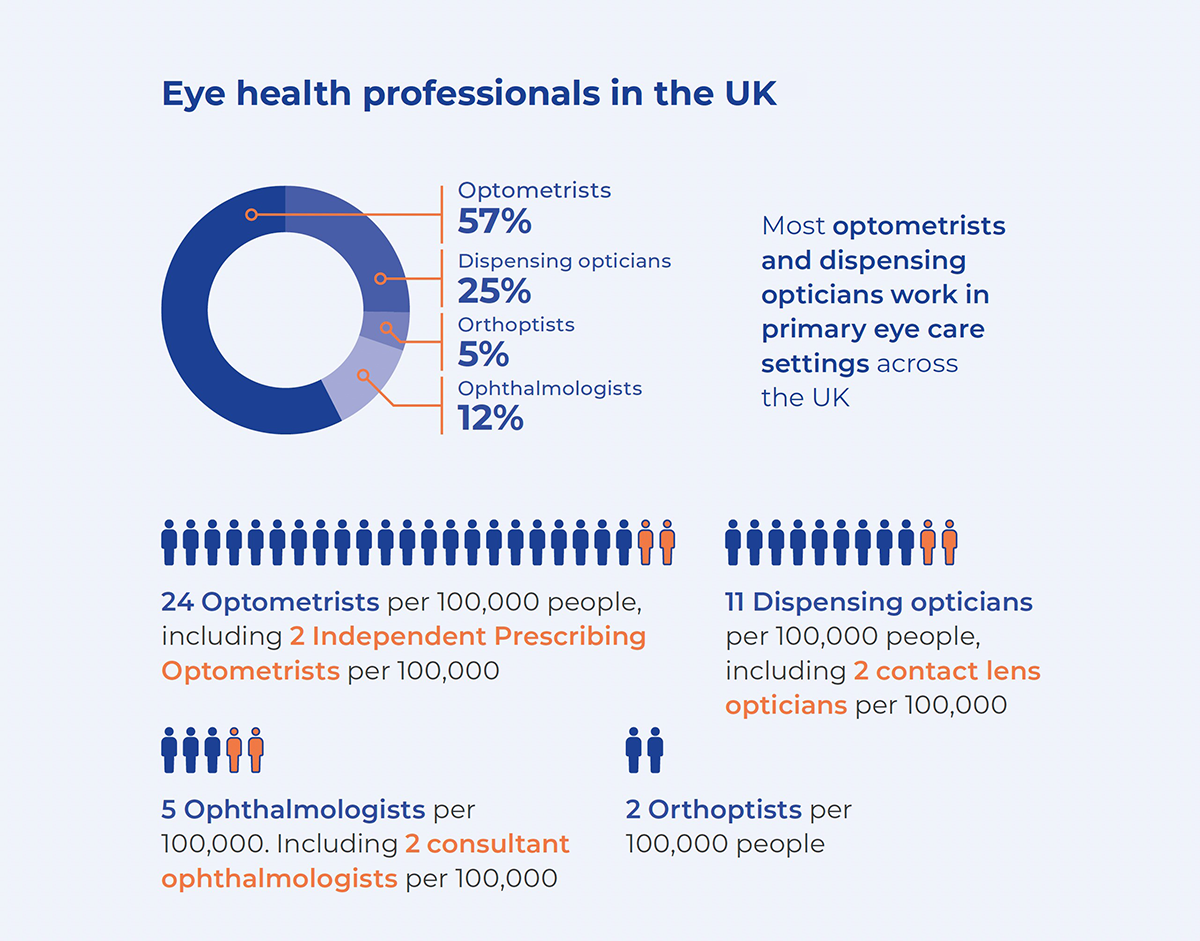- Primary eye care in the UK provides more than 28.5 million appointments each year. This includes sight tests, enhanced eye care services and contact lens care appointments [1]
- Secondary care provides about 9 million appointments each year [2]
- The UK has more than 16,000 optometrists, 7,000 dispensing opticians, 3,500 ophthalmologists and 1,500 orthoptists [2].
Primary eye care in England, Northern Ireland, Scotland and Wales is recognised as one of the world's most advanced eye care systems.
The bedrock of the UK eye health system is the sight test. Legislated for in the Opticians Act, it provides a universal eye health assessment, case-finding and vision correction service from which all other eye care services flow, including ophthalmology. As a result, no child or adult in the UK needs to suffer uncorrected vision or its impacts, and asymptomatic sight-threatening diseases can be detected early.
Thanks to significant advances in diagnostics, surgery and drug therapies, we can now treat and prevent many more cases of sight loss, but our health systems in all four nations are struggling to cope. This includes more than 20 people a month suffering avoidable sight loss due to delays in glaucoma care in the hospital eye service (HES) [3].
Each case of preventable sight loss due to delays in care is a serious incident. We can and must work together across the system to reduce these cases to zero and eliminate system risk. This is an ambitious but achievable goal.
Opticians have provided eye care funded by the NHS since it was founded in 1948. Since 1998, healthcare planning has been increasingly devolved to each of the four nations, which is why eligibility for NHS-funded eye examinations and how much the NHS pays per patient now varies depending on where people live in the UK.
This also explains why, for example, everybody in Scotland is eligible for an NHS-funded eye examination and benefits from a comprehensive primary eye care service. However, people who live in England, Northern Ireland and Wales might have to pay because there is no universal access to an NHS-funded primary eye care service.
The NHS in England, Scotland and Wales and the Health Service in Northern Ireland fund all eye care provided in secondary care but because of devolution, the organisations responsible for organising this care differ in each nation.
Watch these short animations to learn more about enhanced primary eye care services across the UK:
Read about eye care in:
People can also choose to access eye care from ophthalmologists, optometrists and other eye care professionals privately.
Optometrists and dispensing opticians comprise the largest regulated workforce in eye care, followed by ophthalmologists and orthoptists.

Primary care optometrists are also qualified to manage a large and complex caseload. The table below provides an overview of the competencies and qualifications of primary care optometrists.
The section below provides an overview of eye health professionals and how they are regulated.
Regulated by the General Optical Council. Optometrists perform detailed eye examinations to detect defects in vision, ocular disease or other health issues. Many now also perform advanced diagnostic tests and co-manage patients with eye conditions. They form the single largest group of eye care professionals in the UK.
Dispensing opticians
Regulated by the General Optical Council. Dispensing opticians can fit and supply spectacles to children and adults and can advise on and dispense low vision aids. With additional specialist training they can also fit contact lenses and examine the anterior eye for defects and ocular disease.
Orthoptists
Regulated by the Health and Care Professions Council. Orthoptists specialise in diagnosing and treating visual problems involving eye movements. They might have other roles and responsibilities. They typically work in hospital eye clinics but can also work in community settings - for example, when screening in schools.
Ophthalmologists
Regulated by the General Medical Council. Ophthalmologists are medically trained doctors who specialise in eye health. They often do a mix of surgical and non-surgical work, and as they build more experience they typically specialise in a specific sub-speciality, with Health Education England noting eight subspecialty areas in 2019
- Cornea and anterior segment
- Medical retina
- Glaucoma
- Oculoplastic surgery (plastic surgery around the eye)
- Paediatric ophthalmology
- Surgical retina (vitreo-retinal surgeons)
- Primary care
- Medical and neuro-ophthalmology.
You might also be interested in
- Taking care of your eyes
- Evidence-based eye care
- Influence - shaping the future of eye care
- Data hub
[1] FODO, The future of primary eye care - principles and priorities https://www.fodo.com/flipbooks/FODO-Strategy-Document-Full-2023/ shows that there are more than 23 million sight tests each year in the UK. In addition, primary eye care provides 1.5 million enhanced service and more than four million people in the UK use contact lenses and visit their optician at least once a year. Hence, excluding visits for repeat tests and advanced diagnostics, a conservative estimate is that there are at least 28.5 million clinical appointments offered each year across the UK.
[2] FODO, The future of primary eye care - principles and priorities https://www.fodo.com/flipbooks/FODO-Strategy-Document-Full-2023/.

 Patients and public
Patients and public
 Policymakers
Policymakers Members
Members News and views
News and views

